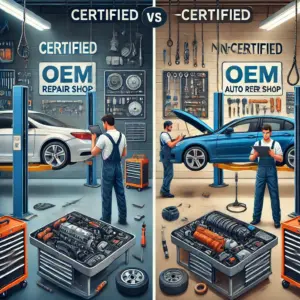Whenever your vehicle requires attention, selecting between a certified or non-certified auto repair shop may prove difficult. Although both might provide comparable offerings, certification often brings valuable extra guarantees of skill, excellence, and dependability. Recognizing these distinctions can guide you to make a choice when pursuing automotive fixes.

Expertise and Training
Certified auto repair shops hire workers who have completed serious instruction and strict examinations to match sector requirements. Groups such as the National Institute for Automotive Service Excellence (ASE) or brand-specific credentials confirm that technicians maintain current insight into maintenance, troubleshooting, and vehicle innovations.
By comparison, shops without certification might employ workers, but they do not need to fulfill formal instructions or testing rules. As a result, their degree of skill and comfort with contemporary vehicle systems may fluctuate significantly, possibly influencing overall repair outcomes.
Quality of Parts and Equipment
A further main contrast between certified and uncertified locations lies in the grade of parts and hardware employed. Certified providers typically rely on original equipment manufacturer (OEM) parts or premium aftermarket options that satisfy performance criteria. They likewise gain entry to sophisticated testing equipment and brand-specific programs, guaranteeing precise issue detection and resolution.
Uncertified venues could rely on aftermarket products or reconditioned items, which may not function as effectively or endure as long. Although these places occasionally present cheaper rates, the chances of early component breakdown or flawed setup rise significantly.
Warranties and Customer Protection
Opting for a certified service provider generally supplies the advantage of warranties on components and labor, granting customers additional genuine reassurance. Numerous car companies and service networks provide promises that safeguard fixes for a defined timeframe or distance. Such coverage proves truly essential if a complication emerges following maintenance.
Meanwhile, uncertified outlets might not include any warranties, or their rules could remain inconsistent and unclear. If something fails during service, you may need to personally cover extra repairs yourself. Certified providers likewise follow proper business mandates and moral guidelines, whereas uncertified options could lack supervision, causing serious possible complications regarding responsibility.
Cost and Convenience
One major factor prompting drivers to opt for uncertified repair providers involves the reduced price. Lacking the operational costs tied to certification, such establishments may offer cheaper rates for work. Yet, the downside is frequently an absence of uniform methods and assurances. Certified outlets might set steeper fees, though their work typically features thorough evaluations, brand-endorsed procedures, and superior materials.
Bearing in mind certain tasks like maximizing SCFM in air compressors, certified auto repair shops might possess a significantly stronger grasp of airflow’s effect on overall vehicle performance, whereas uncertified workers may lack sufficiently focused expertise in those matters.
Conclusion
Selecting a certified or uncertified auto repair provider hinges on serious considerations such as overall finances, trust, and sustained dependability. Certified outlets supply skilled staff, improved components, coverage, and approved guarantees, whereas uncertified options might present cheaper approaches yet carry possible hazards. Evaluating these elements may aid you in determining the choice for your automobile’s care and services.




Leave a Reply